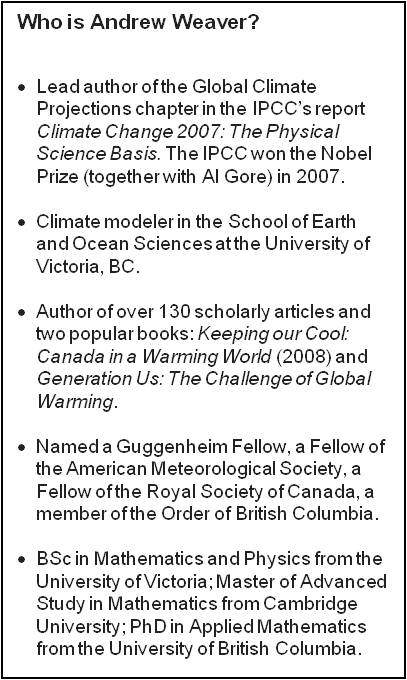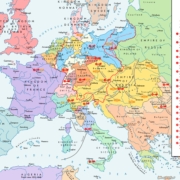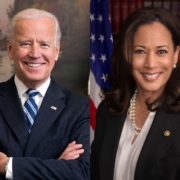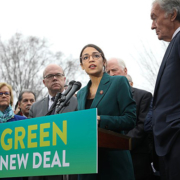Do We Need a Steady State Economy? One Politician’s Surprising Answer
An interview with Andrew Weaver, distinguished climatologist and BC’s first Green MLA
by James Magnus-Johnston
As the concentration of atmospheric carbon dioxide reached the historic high of 400 parts per million, renowned climatologist Andrew Weaver became the first Green candidate ever elected to British Columbia’s legislative assembly. We chatted about politics, the perils of natural gas development, and the public appetite for a steady state economy.
Here’s a politician who thinks his constituents can handle an honest dialogue about climate change. Andrew Weaver doesn’t hide the facts or pander with the wishful thinking of infinite growth. His refreshing candidness might have something to do with his background as one of the world’s preeminent climate scientists.
 As a mathematician, Dr. Weaver spent years modeling the climate and now has a long list of credits to his name. He has witnessed the climate take a turn for the worse recently, but remains an optimist who believes the problem is “entirely solvable with will and determination.”
As a mathematician, Dr. Weaver spent years modeling the climate and now has a long list of credits to his name. He has witnessed the climate take a turn for the worse recently, but remains an optimist who believes the problem is “entirely solvable with will and determination.”
CASSE doesn’t endorse any particular political party, but Dr. Weaver’s experience signals that sometimes a sophisticated debate about complex issues can be a winning political formula. Besides, he said, “the Green Party is not there to form government, but there to facilitate an informed dialogue.”
If B.C.’s Green Party were to one day aspire to govern, I wondered, would it adopt the mainstream agenda of “green growth?” Or would it move more seriously in the direction of a steady state economy?
On Science and Politics
The science of climate change has been “settled,” but political action remains elusive or — in the case of the fracking phenomenon — altogether misguided.
“The scientists have done their jobs,” said Weaver. “Now it’s time for politicians to do theirs.” His voice was hoarse from weeks of intense campaigning.
“I hope I can get some first-rate colleagues who are also willing to stand up and see if we can make a difference,” he stated, suggesting that it’s time for more scientists to become politicians.
“People will try to knock you down and say you’re doing it for selfish reasons, but I wanted to set an example.”
He senses a growing demand for intelligent debate and action on complex issues like climate change. “We don’t give the electorate enough credit,” he told me. “People are fed up with stock messages like ‘those Liberals did this’ and ‘the NDP did this’… you can’t just say ‘no tankers on the coast’ or ‘no’ to some other issue.”
I asked him how he would maintain a positive tone in the legislature. “I would like to see non-partisan caucuses on the environment. I think it’s possible. Progressive MLAs will want to work together — and I don’t mean progressive in terms of the left-right divide, but in terms of wanting to further their knowledge on issues.”
On Energy Policy
As with any campaign trail, Dr. Weaver was challenged by his constituents on a number of policy questions. I wondered which topics resonated with the electorate.
At doorsteps, he said folks wanted to talk about clean, locally-produced energy. They weren’t allergic to the language of economics, either. Dr. Weaver said he used phrases like “the carrot-and-stick approach,” “internalizing externalities,” and “fixing market failures.”
Amid euphoric talk of strong demand for Canada’s resources, he calls natural gas development a “pipe dream.” “Russia has twenty times more natural gas than Canada and they are already supplying gas to China. The U.S. is shifting to clean energy on the west coast, and Australia has abandoned offshore liquid natural gas extraction because they think there’s a price bubble.”
“Under [previous premier] Gordon Campbell, this whole cleantech industry grew and became leaders in the field, but they have lost their guidance”
Now B.C.’s elected officials, he explained, are essentially offering to subsidize natural gas for the Asian market, with little benefit to the provincial economy.
On the Steady State Economy
“Of course we will need something that resembles a steady state economy because it’s a finite world!”
I asked Dr. Weaver to consider the counter-argument: Gail Tverberg wrote recently that a global human population collapse is inevitable; that many animal populations throughout history have followed a pattern of exponential overpopulation and collapse.
“I don’t want to end up on that collapse trajectory and I don’t think we have to do that,” he responded.
Gail notes that human population numbers have correlated closely with energy use — just like economic growth. She argues that we’d have to go back to hunter-gatherer lifestyles to achieve a steady state economy.
She could be right. But why might she be wrong?
Dr. Weaver was quick with his response: “because we’re smarter than phytoplankton!” While phytoplankton or bacteria inevitably grow exponentially in a finite system, human beings are different for a very important reason. “We have brains! We can put men on the moon, we built the Internet! I’m sure we can keep from collapsing!”
There’s that “will and determination” he mentioned earlier.
“You absolutely have to live within your means — financially and ecologically.” He sees the steady state economy as a solution to the world’s most pressing problems. “I’ve been pushing for steady state forest policy and fish farming. Replacing the stocks at at least the rate of replenishment.” He also considers energy policies key to the steady state economy.
So, while Dr. Weaver is adopting elements of a steady state agenda, most political parties avoid the rhetoric of anything but growth when they’re seriously vying to govern. Would B.C.’s Green Party still advance the steady state economy if its chances of governing were to improve?
“Yes, that’s exactly the message that would enable us to form government down the road.”
 "Rappahannock County Courthouse" by taberandrew is licensed under CC BY-NC 2.0
"Rappahannock County Courthouse" by taberandrew is licensed under CC BY-NC 2.0 Creative Commons
Creative Commons



A steady state economy(in an economic sense) is nothing steady with respect to non renewable ressources, it just means same number of barrels burnt this year as previous, same number of cars built, houses built, etc.
As to policies, yet another article not being able to spell clearly the only valid one : VOLUME BASED TAXES ON FOSSILE FUELS.
(volume of energy content or CO2 emitted).
While decreasing taxes on work in parallel, or some direct redistribution schema à la Hansen, like in (2) below :
http://www.guardian.co.uk/world/2009/jan/01/letter-to-barack-obama
Most would agree that a period of degrowth would be a prerequisite for a SSE depending on the level of ecological overshoot. Without delving into specifics, a combination of adequate taxes and regulations is precisely the suggestion made by Dr. Weaver — i.e. “the carrot-and-stick approach,” “internalizing externalities,” and “fixing market failures.” In fact, BC has already instituted a carbon tax.
Human needs are really quite basic perhaps we can choose to balance our level of advancement and sophistication ie simplify our life styles so as to reduce our need for ever increasing resources. Perhaps we can re-evaluate our priorities, examine what is truly satisfying and make us happy starting with our own inner experiences. Perhaps we can place a greater value on a healthy environment for ourselves and all other living creatures. Perhaps we can use all resources more carefully and design all products to be completely recyclable. Perhaps we can value and support the care givers so the children can grow up loved and balanced and so the elderly can live out their lives in dignity. Perhaps we can look out for the vulnerable through out the world so that one day everyone in the world have their basic needs met and can live in peace and dignity. Perhaps we can move from a mentality of self interest that generates wars to a culture that values and supports cooperation, compromise and peace. Maybe this is not something that will be brought about by politics but by each human being making conscious choices in their personal lives. Then the political agendas will have to reflect the priorities of the people.
I am really inspired by Tverberg, but I am afraid he missed the mark in his response to Tverberg.
Tverberg is an extremely competent analyst, and the animal populations to which Tverberg was referring are quite a bit more biologically complex than the phytoplankton on which Weaver rests his case for optimism.
Collapse was modeled in 1972 by the Limits to Growth group and appears inevitable with one exception. The Limits to Growth group assumed that animal protein was required for optimum human development. On a planet with 22 billion head of livestock and 7 billion people, this means collapse. But it turns out that animal protein is not required for optimum human development, and is in fact associated with numerous health risks (if adequate plant-based nutrition, including B-12, is provided.) We also understand from the great work of steady-state ecological economists like Robert Goodland that the majority of catastrophic global warming risk is in fact caused by deforestation and methane emissions related to the livestock sector.
So this is our real reason for hope. It is not because we are “smarter than phytoplankton,” it is because we are carrying 22 billion head of excess livestock “baggage” on Spaceship Earth that we can now replace with plant-based B-12 production.
Sorry, I meant to open with “I am really inspired by Weaver.” And I am!
I met Gail about a year ago and I have respect for her opinion. On the other hand, however, I think you inadvertently gave credence to Dr. Weaver’s point by identifying a primary cause for global warming. I think his point is that we are capable of being self-aware, identifying problems and — optimistically — executing solutions.
That is a fine argument, James, and I am more than happy to join you in giving this credence to Dr. Weaver if he is a proponent of plant-based nutrition and emergency livestock reduction to prevent runaway warming in the Arctic. Do you know if this is the case?